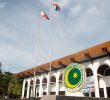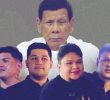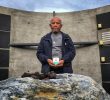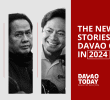The current �people�s initiative� for Cha-cha is itself a mockery of the essence of genuine people�s governance because it reportedly involves bribing voters and local government officials — a classic example of graft and corruption.
By Antonio Tujan Jr.
Ibon Features
MANILA — The shift to a parliamentary system under the proposed charter change (Cha-cha) would �significantly reduce� corruption in the political system, according to House Speaker Jose de Venecia.
De Venecia said the proposed shift would set elections on a five-year cycle and provide state funding to move the country towards a strong two-party system. He added that a parliamentary government tainted by corruption could fall through a no-confidence vote introduced in parliament but a presidential system offers only the difficult process of impeachment to remove a president.
But the proposed shift to a Parliamentary system is a shallow response to a societal problem that is more deep-rooted that government realizes, or cares to admit.
Corruption is systemic and a product of the form of governance dominated by a small ruling elite who has regarded government or public office as an extension of their property or business. Thus, without people�s governance, any mechanism to solve corruption will only fail miserably.
People�s governance is the only effective and most comprehensive solution to corruption. Unfortunately, the current Cha-cha drive has less to do with promoting people�s governance and more to do with salvaging an illegitimate regime tainted with allegations of severe corruption.
The current people�s initiative for Cha-cha is itself a mockery of the essence of genuine people�s governance because it reportedly involves bribing voters and local government officials�a classic example of graft and corruption.
Corruption is Systemic
Stressing that corruption can be minimized by adopting a system that would make it easier to replace a corrupt chief executive is confusing the issue by viewing corruption as an individual act instead of the product of a flawed system.
Corruption is generally defined as �using public power for private gain�. The problem however is that this definition is commonly interpreted in terms of individual acts, focusing on the issue of how �private gain� is made. Instead of focusing on the nature of public power and how it is organized by the elite to fit their interests, thus providing the foundation for systemic and systematic corruption, the focus is on creating mechanisms or instruments to prevent individual cases.
In the Philippines, corruption is the manifestation of an even bigger socio-economic problem, one that has been described as far back as the 1960s as �bureaucrat capitalism.�
As early as the US colonial era, local bureaucrats were weaned and bribed by colonial masters to uphold a system of foreign domination and exploitation. These �bureaucrat capitalists� partook of the wealth that was extracted by local big business and landlords while upholding the interests of monopoly capital. They used the government as a giant private enterprise in the service of profit. Graft and corruption became integral to the Philippine state.
The most efficient and trusted bureaucrats gained the political and financial backing of the US during the elections. A tradition of subservience was carried on by succeeding administrations. Bureaucrat capitalism reached its acme in the Marcos dictatorship which has become the model of the Arroyo administration.
So it hardly comes as a surprise when there were widespread allegations in 2001 of bribes or pay-offs to lawmakers for the immediate passage of anti-people measures such as the Electric Power Industry Reform Act (EPIRA). The big monopolies clearly had the lawmakers in their pockets. And some players in the power sector were ahead of the others in securing deals from the government.
Nor should it be unexpected that President Arroyo and the First Gentleman were accused of stashing away undeclared campaign contributions running to the millions of pesos.
People�s Governance
Hence, a change from presidential to parliamentary in the current political context would not truly address the issue of political corruption. In fact, in a ruthlessly corrupt system, including the legislative branch of government, a parliamentary system could lead to a longstanding authoritarian rule fed by corruption of the ruling alliance– a phenomenon that has already made itself felt in the Lower House since the 1990s.
Fighting corruption in the Philippines should go beyond simply devising and honing mechanisms to weed out and punish corrupt officials. Ensuring that genuine democratic governance is exercised in various government projects and activities focuses on the organization of public power that is participatory and truly democratic, and thus is genuinely transparent, accountable and preventive of corruption. This is what any genuine charter change should focus. This is what the current charade of charter change pushed by Arroyo and De Venecia�s Lakas is not all concerned about.
Scandals of corrupt, elite politics under a system of patronage that characterizes the Philippine political system are now a daily phenomenon, and right minded Filipinos want to do something to stop this problem. �People power� is a more militant form and now a more important form of people�s governance, where people undertake collective militant action to challenge governance processes in the country and build from the bottom up true democratic action.
Participation means that people should become the decision makers in public policy. This requires building into the system such key features such as participation, transparency, accountability, and equity. That way, the views of the masses especially are actively solicited through processes of decision making that ensures their genuine participation.
Transparency and accountability take on a deeper meaning in a true people�s governance. People are provided access and knowledge of issues and concerns in order to ensure their full participation in decision-making. Accountability also goes beyond concepts of being subject to accountability mechanisms, but permeates the whole concept and operation of public office and the exercise of public power. Thus, representatives and officials would actively seek out consultation and participation of the people in the exercise of their political functions.
People�s governance and the internalization of its key features into government are the only way that deep-seated political corruption in the country can be addressed. (Ibon Features)










